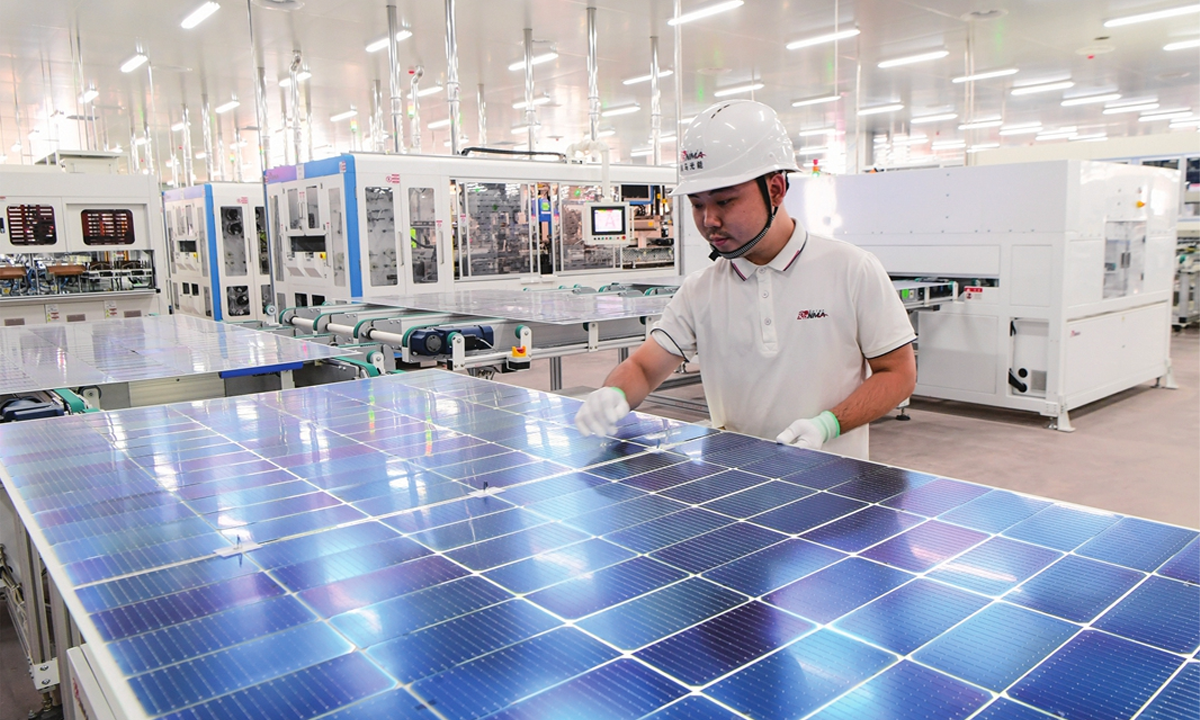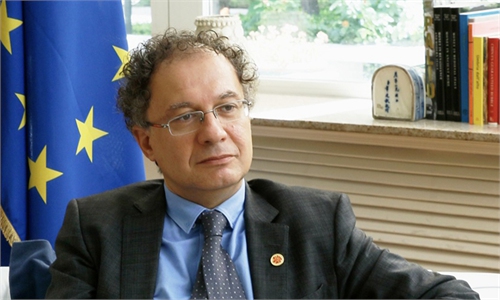BRI partner countries embrace green, sustainable development, supported by Chinese companies
Solar panels, wind turbines, electric batteries to mitigate climate change

A worker makes photovoltaic parts at a workshop in Jinhua, East China's Zhejiang Province on October 15, 2023. Photo:VCG
Green development truly matters, said Zafar Uddin Mahmood, former special assistant to the prime minister of Pakistan, adding that "Thanks to China-proposed Belt and Road Initiative (BRI),significant changes have driven Pakistan's green transformation, including the solar and wind power facilities from scratch."
Mahmood was interviewed by Global Times at the High-level Forum on Green Silk Road for Harmony with Nature held in the sideline of the 3rd Belt and Road Forum for International Cooperation (BRF) in Beijing.
More than 400 people from over 40 countries attended the green development forum, sharing the results of "Green Silk Road" construction in the past decade.
In the past 10 years, China has signed 46 climate-change related cooperation deals with 39 developing countries, as green development has gained broader consensus among BRI partners.
Experts said that based on what has been attained the forum reflects China's proactive approach to addressing climate change, with Beijing playing a significant leadership role in promoting green and sustainable development in the world.
Joint green efforts
Jointly building a Green Silk Road is a significant move to promote low-carbon development of the developing countries and build a clean and beautiful world, Chinese Vice President Han Zheng said on Wednesday at the high-level forum on green development, the Xinhua News Agency reported.
China has accelerated green transformation in its energy sector, continuously improving the atmospheric air quality, actively participated in and led global environmental governance, and made contributions to the building of a community with a shared future for humanity and promoting global sustainable development, Han said.
During the forum, the Chinese government unveiled three notable plans - the Beijing Initiative for Belt and Road Green Development, the Green Investment and Finance Project and the Action Plan for Green Technology Development in Central Asia.
The Beijing Initiative advocates enhanced collaboration in climate change mitigation, biodiversity management, air pollution control, green infrastructure and green energy build-up. Meanwhile, the other two programs aim to foster cooperation in the realm of green financing and investments.
At the forum, heads of state and international organizations delivered speeches, expressing their willingness to engage in proactive cooperation in constructing the Green Silk Road.
UN Secretary-General António Guterres said that he recognizes the efforts of the Green Silk Road initiative to anchor investments in sustainable solutions, which is also an area the UN is poised to support.
Echoing what the UN Secretary-General said, Mahmood told the Global Times that the involvement of Chinese enterprises under the BRI has brought about significant changes to accelerate energy transformation in Pakistan.
In the past, Pakistan hardly had any solar or wind power facilities, and although there were some hydropower projects, they hadn't been updated for many years. "Thanks to the China-Pakistan Economic Corridor (CPEC) under the BRI, we've made a breakthrough from zero to one, with the establishment of solar and wind energy projects," Mahmood said.
Now, in every sector, whether it is road construction and port development, environment protection is an integral part of the job, Mahmood said, noting green development will serve as a key direction for the CPEC projects between the two countries.
Rising low-carbon spending
Not only in Pakistan, Chinese companies have also expanded their global presence to launch green projects, backed up with investments and advanced supply chains.
The export value of China's solar panels, lithium-ion batteries and electric vehicles - stood at 799 billion yuan ($109 billion) in the first three quarters the year, soaring 41.7 percent year-on-year. The export value has grown by double digits for 14 consecutive quarters, according to official data.
Moreover, more cooperative deals were inked at the BRF. At the forum, TCL Zhonghuan Renewable Energy Technology Co signed a joint development agreement with Saudi Vision Industries to jointly establish a crystalline silicon wafer project in Saudi Arabia, with the first-phase production capacity expected to reach 20 gigawatts, the Global Times learned.
This project marks the first link of the photovoltaic industry chain in the Middle East country. By implementing this project, the company aims to create Saudi Arabia's first photovoltaic industry chain, aided with cutting-edge technology.
"This endeavor will bridge the gap in the upstream segment of the photovoltaic industry chain in the Middle East and contribute to the realization of the goals set by Saudi Vision 2030," according to TCL Zhonghuan Renewable Energy Technology Co.
On the same day, the world-leading solar technology company LONGi Green Energy Technology officially launched the first phase of its Serendah Module Plant in Malaysia, the company told the Global Times. Located in Serendah, Selangor state on Malaysia's west coast, the facility is an integral part of LONGi 's manufacturing strategy in the country.
The 566,560-square meter module factory, with an investment of 1.8 billion ringgit ($380 million), represents LONGi's inaugural manufacturing presence in West Malaysia. There will be two phases of construction, with a combined capacity of 8.8 gigawatts, the company said.
The first phase is already operating and work has started on the second phase. The Serendah Module Plant has created 900 local jobs, with the number anticipated to exceed 2,000 eventually.
"We are offering the world the most cost-effective and reliable practices and approaches for renewable energy," said Zhang Jianyu, executive director of the BRI Green Development Institute, while attending the high-level forum on green development on Wednesday, adding that China has reduced the cost of solar panels by 85 percent thanks to its robust manufacturing capability.
Zhang said that China will continue to consolidate its experience in domestic sustainable green development, and leveraging on the experiences to assist other partner countries in ramping up their green endeavors.



